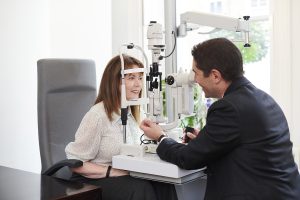A Day in the Life of an Ophthalmic Surgeon

The human eye is one of the most complex organs in the human body (second only to the brain, in fact). With its over two million working parts, the eye collects light, focuses it, and converts it into the image we see of the world around us constantly and with apparent ease.
There is no overestimating the value of the eyes’ work. And as such, tinkering with this impressive system is not a job for the faint of heart. Despite being, on average, less than two inches across, the complexity of the eye demands several specialist roles within the medical field.
Ophthalmologists, optometrists, and orthoptists are all professions dedicated to optics – the study of light and the instruments used to detect it (our eyes). Each plays an important role in the care and treatment of our eyes and vision, but most of us will be blissfully unaware of the differences between these distinct eye specialists.
In this article, we will explore some of these professions in more detail to give you a clearer understanding of the different roles in eye care. This should help you to distinguish whom to see for what eye-related problems.
We’ll then walk you through what it’s like to spend a day in the life of an ophthalmic surgeon.
What is an Ophthalmologist?
An ophthalmologist is a medical professional who specialises in eye and vision care. They act as both a physician (someone who diagnoses and treats medical conditions) and surgeons, performing surgical procedures relating to the eyes and visual system.
As such, ophthalmologists are considered all-around eye specialists. Their work involves the examination, diagnosis, and treatment of diseases, injuries, and any irregularities concerning the eyes.
Becoming an ophthalmologist requires extensive training, including five years of medical school, two years as a qualified doctor, and an additional seven years of ophthalmic specialist training.
After 12 to 13 years of education and training, ophthalmologists are licensed to practice ophthalmic medicine and surgery. The level of expertise required to reach this point allows them to diagnose and treat a wider range of conditions than optometrists and opticians.
Their expertise often means they are equipped to recognise other health conditions that aren’t directly related to the eyes, and refer patients to other medical professionals when necessary. Moreover, ophthalmologists may also be involved in scientific research exploring the causes and treatments of problems and diseases of the eyes.
Ophthalmologist Sub-Specialists
Some ophthalmologists choose to pursue further specialised training in a specific area of eye care. These professionals are known as ophthalmologist sub-specialists. This typically involves a few years of additional training, called a Fellowship, which provides them with a high level of knowledge on a particular subject.
Some of the main speciality areas in eye care include glaucoma, cornea, retina, and Laser Eye Surgery.
London’s Western Eye Hospital offers a prestigious one-year fellowship in Cornea and Anterior Segment Pathology and Surgery. At London Vision Clinic, we offer an 18-month fellowship in Laser Refractive Surgery.
Optometrist
Optometrists are probably the most recognised health providers included in this article. They are often the first port of call for primary vision care. They are the ones who examine your eyes, test your vision and give you advice on refractive errors, and prescribe and fit your glasses or contact lenses.
Optometrists work in a range of settings, from hospitals to high-street glasses providers. Some optometrists may also be involved in the care of patients with chronic eye conditions.
Becoming an optometrist typically involves studying a three-year degree in optometry, as well as one year of experience and completion of the Professional Qualifying Examination.
While an optometrist is not a medical doctor, they are licensed to practice optometry. For this reason, optometrists and ophthalmologists often work together as a team.
Orthoptists
Orthoptists specialise in diagnosing and treating disorders related to binocular vision and eye movement. For example, you may need to see an orthoptist if you have a condition such as amblyopia (lazy eye).
If you think you might need to see an orthoptist, you can find more information on the British and Irish Orthoptic Society website.
A day in the life of a specialist ophthalmic surgeon
Now that we’ve established what different eyecare professionals do, let’s take a closer look at what a day in the life of one of them might look like. In fact, we’ll follow the typical daily routine of an expert who is a fellow of three sub-speciality regulatory bodies, founder of a world-renowned clinic, and among the best in the world at what they do.
We are, of course, talking about our founder and lead surgeon, Professor Dan Reinstein!
When he’s not speaking at international medical conferences or out playing the saxophone, Professor Reinstein starts his day like countless others: with breakfast at his family home and a gym session. But then it’s time to get down to what Dr Dan does best.
Most of Professor Reinstein’s day is spent meeting prospective, current, and past patients and, of course, performing Laser Eye Surgery procedures. Thankfully, our Harley Street clinic is just a short distance from his home, so he’s able to arrive promptly, ready to face the day of work.
In fact, Professor Dan would hardly call what he does “work”. Being able to do what he loves on a daily basis, changing people’s lives for the better, is a delight for him. What’s more, as no day is ever the same as the last, he never gets tired of it.
If you’d like to learn more about our treatments and services, get in touch with one of our friendly clinic coordinators today. Alternatively, Book a Consultation to learn more about your options.


